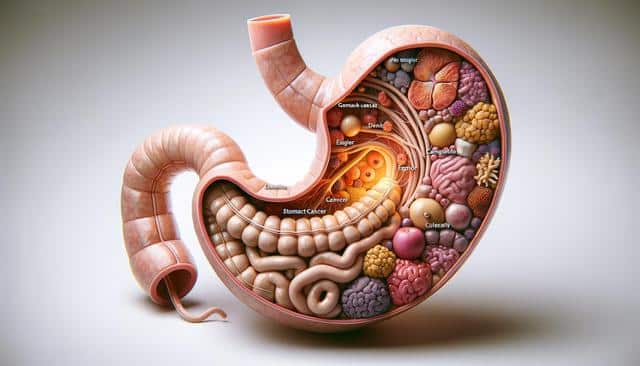
Understanding Early Stomach Cancer: What You Need to Know
What Is Early Stomach Cancer?
Stomach cancer, also known as gastric cancer, begins in the lining of the stomach. When it is caught early, before it spreads beyond the stomach wall, treatment options are typically more effective. However, early stomach cancer often presents with mild or vague symptoms, which can make diagnosis challenging. Understanding what early stomach cancer is and how it develops is key to recognizing it in time.
This condition usually starts when cells in the stomach lining mutate and begin to grow uncontrollably. These changes may be triggered by a combination of genetic and environmental factors, including diet, infections, and chronic inflammation. In the earliest stages, cancer may be limited to the mucosa, the innermost layer of the stomach.
Some common characteristics of early stomach cancer include:
- Localized tumors that have not yet spread to lymph nodes or other organs
- Symptoms that may be mistaken for common digestive issues
- Potential to be treated with less invasive procedures compared to advanced stages
Because early detection is crucial, awareness of the condition and its warning signs can make a significant difference in outcomes.
Common Symptoms to Watch For
One of the most challenging aspects of early stomach cancer is that its symptoms can be subtle or even absent. When symptoms do appear, they may resemble those of more common gastrointestinal issues, which can delay diagnosis and treatment. Recognizing these early warning signs and seeking medical advice promptly is essential.
Typical symptoms of early stomach cancer include:
- Persistent upper abdominal discomfort or pain
- Feeling full quickly after eating only a small amount
- Unintentional weight loss without a clear cause
- Nausea or vomiting
- Loss of appetite and fatigue
These symptoms may come and go or become progressively worse over time. If you experience any combination of the above signs, especially if they persist for more than a few weeks, it is advisable to consult a healthcare professional. Early diagnosis can lead to more treatment options and a better chance of managing the condition effectively.
Diagnosis and Screening Methods
Diagnosing early stomach cancer requires a combination of clinical evaluations and diagnostic tools. Since physical symptoms are often not definitive, doctors rely on medical history, physical exams, and imaging or endoscopic procedures to confirm the presence of cancerous cells in the stomach lining.
Common diagnostic methods include:
- Upper endoscopy: A flexible tube with a camera is inserted through the throat to examine the stomach lining directly.
- Biopsy: During an endoscopy, small tissue samples may be taken from suspicious areas for laboratory analysis.
- Imaging tests: CT scans, X-rays with contrast, or MRI scans can help determine the extent of the disease.
- Blood tests: While not always conclusive, certain biomarkers may support a diagnosis when combined with other findings.
In some regions or for individuals at higher risk, screening programs may be available. These proactive checks are especially useful for detecting stomach cancer at an early stage, even before symptoms appear. Early screening is particularly recommended for those with a family history of stomach cancer or predisposing conditions like chronic gastritis or Helicobacter pylori infection.
Risk Factors and Prevention
Several risk factors can increase the likelihood of developing stomach cancer. While some of these are beyond individual control—such as age or genetic predisposition—others can be managed through lifestyle choices and medical care. Understanding these risk factors can help individuals take preventive action when possible.
Key risk factors include:
- Chronic infection with Helicobacter pylori bacteria
- Long-term inflammation of the stomach lining (gastritis)
- Smoking and excessive alcohol consumption
- A diet high in salty, smoked, or pickled foods
- Family history of stomach cancer
Preventive strategies may include:
- Eating a diet rich in fresh fruits and vegetables
- Reducing intake of processed and preserved foods
- Quitting smoking and limiting alcohol use
- Seeking early treatment for gastrointestinal symptoms
- Regular check-ups for those with increased risk
By minimizing exposure to known risk factors and maintaining regular health screenings, individuals can reduce their chances of developing stomach cancer or catch it early when it is more manageable.
Treatment Options for Early Stomach Cancer
When stomach cancer is identified in its early stages, treatment is often more effective and less invasive. The choice of treatment depends on several factors, including the size and location of the tumor, the patient’s overall health, and the presence of any pre-existing conditions. Treatment plans are typically developed by a team of medical professionals to ensure comprehensive care.
Common treatment options include:
- Endoscopic resection: A minimally invasive procedure to remove cancerous tissue from the stomach lining, often used when the tumor is small and confined.
- Surgery: In cases where endoscopy is not sufficient, partial or total removal of the stomach (gastrectomy) may be necessary.
- Chemotherapy: Used before or after surgery to shrink tumors or destroy remaining cancer cells.
- Targeted therapy: Medications designed to attack specific cancer cell markers with fewer side effects than traditional chemotherapy.
- Radiation therapy: Less commonly used in stomach cancer but may be considered in certain cases.
Recovery and follow-up care are essential parts of the treatment process. Patients may need dietary adjustments, physical rehabilitation, and emotional support as they heal. Early stomach cancer, when treated promptly and properly, can often be managed successfully, improving long-term outcomes and quality of life.
Conclusion: The Importance of Early Action
Early stomach cancer can be difficult to detect, but understanding the symptoms, risk factors, and available treatments can make a significant difference. Prompt medical attention and regular monitoring are crucial for those experiencing persistent digestive issues or who fall into higher-risk groups. By staying informed and proactive, individuals can improve their chances of early detection and successful treatment. If you or someone you know is experiencing signs of stomach discomfort or unexplained weight loss, don’t delay in seeking professional advice. Taking action early may lead to more manageable treatment and better health outcomes.


